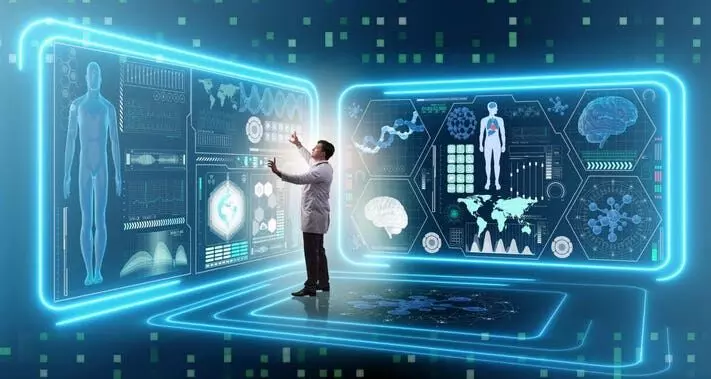AI Revolutionizing Healthcare: From Diagnostics to Personalized Medicine

In a world where technology continues to redefine industries, healthcare stands at the forefront of an artificial intelligence (AI) revolution. From diagnosing diseases to crafting personalized treatment plans, AI is reshaping the landscape of modern medicine, promising greater precision, efficiency, and accessibility in patient care.
AI in Diagnostics and Imaging: Enhancing Precision
One of the most transformative applications of AI in healthcare is in the field of diagnostics and medical imaging. AI-powered algorithms can now analyze X-rays, MRIs, and CT scans with remarkable accuracy, often matching or even surpassing human radiologists. These tools are capable of detecting minute abnormalities, such as early-stage tumors, that might be missed by the human eye. In pathology, AI assists in identifying cancerous cells from tissue samples, enabling faster and more reliable diagnoses.
Personalized Medicine: Tailoring Treatment to the Individual
AI is also driving the era of personalized medicine. By analyzing vast amounts of genomic data, AI can identify specific mutations in a patient's DNA, allowing doctors to tailor treatments to the individual's unique genetic makeup. This approach is particularly powerful in fields like oncology, where treatments can be customized to target specific cancer cells while minimizing harm to healthy tissue. In pharmacogenomics, AI helps predict how different patients will respond to various medications, ensuring that the right drug is administered in the right dose.
Predictive Analytics: Anticipating Health Challenges
Beyond diagnostics, AI is playing a crucial role in predictive analytics. By mining electronic health records and other data sources, AI systems can predict the likelihood of patients developing conditions such as diabetes or heart disease. This early warning system allows healthcare providers to intervene sooner, potentially preventing the onset of disease altogether. AI can also forecast patient outcomes, helping to identify those at risk of complications post-surgery or hospitalization.
Advanced Treatment Planning and Robotic Surgery
AI's influence extends into treatment planning and surgery. Clinical decision support systems powered by AI analyze patient data alongside the latest medical research to recommend the most effective treatment strategies. In the operating room, AI-driven robotic systems are enhancing surgical precision. These robots assist surgeons in performing complex procedures with greater accuracy, reducing the risk of human error and improving patient outcomes.
Boosting Operational Efficiency in Healthcare Facilities
Operational efficiency is another area where AI is making a significant impact. By optimizing scheduling for patients, staff, and operating rooms, AI reduces wait times and improves resource allocation. This streamlining extends to supply chain management, where AI forecasts demand for medical supplies, helping hospitals maintain adequate inventory levels without overstocking.
Drug Discovery: Accelerating the Journey from Lab to Patient
AI is revolutionizing drug discovery by analyzing vast datasets of chemical and biological information to identify potential drug candidates. This capability dramatically speeds up the process of bringing new drugs to market. Moreover, AI aids in the design and optimization of clinical trials, ensuring that the most promising treatments are tested efficiently and effectively.
Telemedicine and Remote Monitoring: Expanding Access to Care
The rise of telemedicine has been supercharged by AI. AI-powered wearable devices monitor patients' vital signs in real-time, alerting healthcare providers to potential issues before they become critical. Virtual health assistants, driven by AI, offer patients basic medical advice, mental health support, and reminders for medication, making healthcare more accessible than ever before.
Managing and Securing Health Data
As healthcare data continues to grow, AI is essential in managing and securing this information. Natural language processing (NLP) technologies extract valuable insights from unstructured data, such as doctors' notes and research papers, while AI-driven cybersecurity measures protect patient data from increasingly sophisticated threats.
Public Health and Epidemiology: AI in Disease Surveillance
AI's potential also shines in public health. Disease surveillance systems powered by AI can analyze data from various sources—ranging from social media to travel patterns—to track and predict the spread of infectious diseases. This capability enables governments and organizations to respond swiftly to emerging health threats, potentially averting widespread outbreaks.
Challenges and Ethical Considerations
Despite its promise, the integration of AI in healthcare is not without challenges. Ensuring the privacy of patient data, addressing biases in AI algorithms, and maintaining the human touch in patient care are critical concerns. Moreover, ethical considerations, such as transparency in AI decision-making and equitable access to AI-driven healthcare, must be addressed to fully realize AI's potential.
A Future of Enhanced Healthcare
As AI continues to advance, its role in healthcare is likely to expand, offering even greater precision, personalization, and efficiency. From diagnostics to treatment and beyond, AI is not just a tool for healthcare professionals—it is poised to become an indispensable partner in the quest for better health outcomes worldwide.
